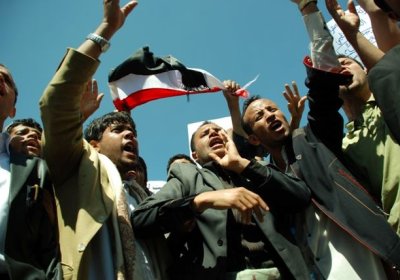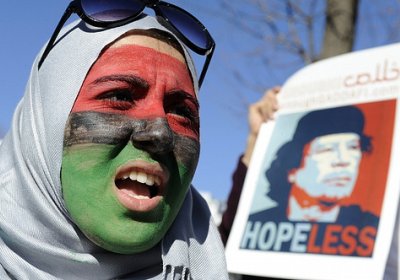Tens of thousands of people have taken to the streets of Yemen in anti-government protests. Demonstrators have demanded an end to the long-running regime of President Ali Abdullah Saleh.
Yemen’s coalition of political opposition parties, the Joint Meeting Parties (JMP), finally joined the protests in late February. This came after a speech in which Saleh, who has ruled Yemen for more than 30 years, blamed uprisings on a conspiracy by foreign governments — specifically the United States — to destabilise the nation.
871
In a joint statement on February 25, indigenous communities that make up the Native Federation of Madre de Dios River and Tributaries in south-eastern Peru rejected a military crackdown on illegal mining on their lands.
The statement said it was a “false solution to a problem that has social and economic roots”.
Environment minister Antonio Bracks authorised the operation in mid February —involving about 1000 police and infantrymen — to destroy illegal mining equipment including bombing of dredges.
A rally was held on February 28 to protest against the recent decision of a London court to extradite WikiLeaks editor-in-chief Julian Assange to Sweden to face questioning on allegations of sexual assault.
Assange’s legal team announced it would appeal the decision.
The rally was held under the themes "We deserve the truth!”, “Hands off WikiLeaks!” and “Free Julian Assange!"
MELBOURNE — About 200 people marched against the NT intervention and for equal pay and jobs with justice for Aboriginal workers on March 4.
The rally was organised by the Melbourne Anti-Intervention Collective. It demanded an end to the exploitation of Aboriginal workers in the Northern Territory.
The intervention, which quarantines the welfare payments of targeted people,
has meant that Aboriginal people are in effect working for rations cards while living in extreme poverty.
US-backed dictators have ‘moral scruples’
“[P]ro-American dictatorships have more moral scruples. The comparison is akin to what happened in the 1980s when U.S. allies led by authoritarians fell peacefully in the Philippines, South Korea and Taiwan, even as Communist regimes proved tougher.”
— February 16 WSJ editorial.
Supporting its dictators
“The [Obama] administration has submitted a proposed budget for fiscal 2011 that included military assistance increases for Bahrain, Libya, Morocco, Oman and Yemen.”
David Hicks was one of the first “war on terror” detainees to be sent to the US military prison at Guantanamo the day it opened in January 2002.
In a February 16 article, Truth-out.org’s Jason Leopold introduced Hicks as “the Australian drifter who converted to Islam, changed his name to Muhammed Dawood and ended up at training camps in Afghanistan the US government said were linked to al-Qaeda, one of which was visited by Osama bin Laden several times.
On March 8, women’s rights campaigners around the world will celebrate the 100th International Women’s Day (IWD).
There could be no more fitting testament to the meaning of IWD than the words of one of the thousands of Egyptian women who joined the democracy protests in Tahrir Square in Cairo last month. The people’s struggle to be rid of dictator Hosni Mubarak, she said, is also a struggle for women’s rights: "[Before] we had nothing, now I guess we will take everything."
IWD was born in a time of great social turbulence and huge struggles by ordinary people for a better life.
Pro-democracy protests have escalated in Bahrain after the US threw its support behind the monarchy and tanks from Saudi Arabia were seen entering the country.
Up to 200,000 people marched in the capital, Manama, on February 25, The New York Times said that day — a staggering size given Bahrain's population is only 1.2 million, and more than half of these are foreign guest workers. The protesters converged on Pearl Roundabout in two huge crowds.
The article below is abridged from SocialistWorker.org. Protest messages to the Zimbabwe embassy in Australia can be sent to zimbabwe1@iimetro.com.au .
* * *
The resistance sweeping the Arab world and the repression against it has reached southern Africa, where more than 50 activists have been arrested by the Zimbabwean regime of President Robert Mugabe.
Those arrested include former member of parliament Munyaradzi Gwisai and other members of the International Socialist Organization (ISO) in Zimbabwe.
The Wisconsin-based National Football League (NFL) team Green Bay Packers — the only fan-owned, non-profit franchise in major US sports — won the Super Bowl on February 6, bringing the Lombardi trophy back to Wisconsin.
But now, past and present members of the “People’s Team” are girding up for one more fight, and this time, it’s against their own governor, Scott Walker.
The US government says it wants “stability” in the Arab world. That sounds reasonable, right?
However, as US author and political analyst Noam Chomsky explained to Press TV on February 24, for the US government, “stability” means something other than what most people would think.
“You have to remember that stability is a cold code word,” Chomsky said. “Stability doesn't mean stability; it means obedience to US domination … [It] doesn't mean that things are calm and straightforward, [it] means they are under control. That of course it is inconsistent with democracy.
The regime of Muammar Gaddafi has escalated its violence against rebel forces seeking to bring it down.
On March 6, opponents of the regime were reported to be in control of several cities, especially in Libya’s east.
AlJazeera.net said on March 4 that anti-government protests in the capital, Tripoli, had been met with tear gas by security forces.
Opponents said Az Zawiyah, a town just 40 kilometres from Tripoli that is home to an oil refinery, was mostly under rebel control.
- Previous page
- Page 2
- Next page







